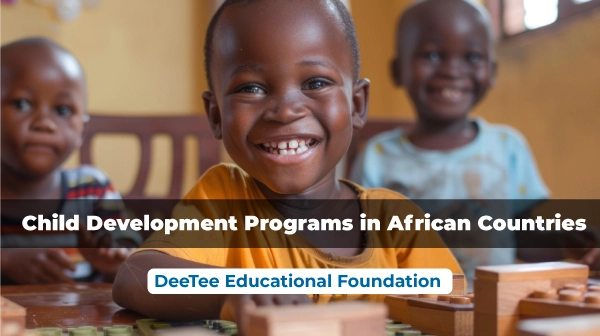Introduction to Child Development Programs in Africa
Child development programs play a vital role in shaping the future of African nations. As these countries continue to develop, there is a growing recognition of the importance of investing in the education, health, and overall well-being of children. Effective child development initiatives not only empower young individuals but also pave the way for strong, resilient communities and economic growth.
Why Child Development is Crucial for Africa’s Future
In Africa, child development is seen as a critical pillar for the future. Investing in early childhood education, nutrition, and healthcare helps break the cycle of poverty and enables children to realize their full potential. Studies show that children who receive proper education and healthcare during their formative years are more likely to become productive adults who contribute to national development.
Challenges Facing Child Development in African Countries
Unfortunately, African nations face a myriad of challenges when it comes to supporting child development. These include:
- Poverty: Many families cannot afford to provide their children with the basic needs like food, healthcare, and education.
- Lack of Resources: Schools, healthcare centers, and child development services are often underfunded and understaffed.
- Infrastructural Barriers: In rural areas, lack of access to facilities and resources is a significant hurdle.
The Role of NGOs in Child Development
Non-Governmental Organizations (NGOs) have stepped in to fill gaps in government services, particularly when it comes to child development. NGOs working in Africa, such as DeeTee Educational Foundation, have been instrumental in ensuring that children, especially those from underprivileged backgrounds, have access to education, healthcare, and a safe learning environment.
Education as a Pillar for Child Development
One of the core components of child development programs is education. Providing access to quality education allows children to develop critical thinking skills, creativity, and problem-solving abilities. Educational programs that focus on early learning ensure that children are equipped with the tools they need for long-term success.
Healthcare’s Role in Child Development
Child development cannot be fully realized without addressing health concerns. Healthcare services, such as immunizations, regular check-ups, and treatments for common childhood diseases, are essential for ensuring children grow up healthy and strong.
Nutrition Programs for African Children
Malnutrition is a severe issue in many African countries, and it can impede the physical and cognitive development of children. Nutrition programs play a key role in providing children with the necessary nutrients for healthy growth, ensuring they can fully participate in educational and social activities.
The Role of Government Policies in Child Development
Government initiatives and policies can significantly influence child development programs. By implementing policies that prioritize education, healthcare, and child welfare, governments can help create an environment where every child has the opportunity to succeed.
Community Involvement in Child Development Initiatives
Local communities are critical to the success of child development programs. Grassroots involvement ensures that programs are adapted to the specific needs of each community, which improves sustainability and long-term success.
DeeTee Educational Foundation’s Impact on Child Development
DeeTee Educational Foundation is one of the prominent NGOs working to provide underprivileged African students with educational resources, tuition sponsorship, and career mentorship. The foundation focuses on supporting students in 6th to 12th grades and college freshmen, empowering them to pursue rewarding careers through access to quality education and a safe learning environment. DeeTee’s initiatives are helping break socio-economic barriers and create a brighter future for children in Africa.
Vocational Training and Skills Development for Adolescents
As children transition into adolescence, vocational training programs offer them practical skills to help them find jobs or start their own businesses. These programs equip young people with the technical and life skills needed for self-reliance and economic empowerment.
The Impact of Technology on Child Development Programs
Technological advancements are increasingly being used to support child development programs. From e-learning platforms to telemedicine, technology is helping to overcome geographical barriers and improve access to education and healthcare services.
Partnerships Between NGOs and Governments
Partnerships between NGOs and governments are essential for scaling up child development programs. By working together, these entities can share resources, knowledge, and expertise, ultimately reaching more children and ensuring the sustainability of programs.
Case Studies: Successful Child Development Programs
Throughout Africa, there are numerous examples of successful child development programs. These include initiatives that focus on early childhood education, healthcare provision, and community-driven efforts that ensure the well-being of children.
Conclusion and Future of Child Development in Africa
Child development programs are crucial for shaping Africa’s future. By investing in children’s education, health, and well-being today, African nations can build a stronger, more prosperous tomorrow. Organizations like DeeTee Educational Foundation are leading the charge, and with continued support from governments, NGOs, and communities, the future looks bright for African children.
FAQs
- What are the key factors influencing child development in African countries?
Key factors include access to education, healthcare, proper nutrition, and community involvement. - How does education affect a child’s development?
Education helps children develop essential cognitive and social skills, preparing them for future success. - Why is nutrition critical in early child development?
Good nutrition ensures that children grow physically and mentally, allowing them to reach their full potential. - How can people support child development programs in Africa?
People can support by donating, volunteering, or partnering with organizations like DeeTee Educational Foundation. - What are the challenges of implementing child development programs?
Challenges include funding shortages, limited access to resources, and infrastructural barriers in rural areas.

